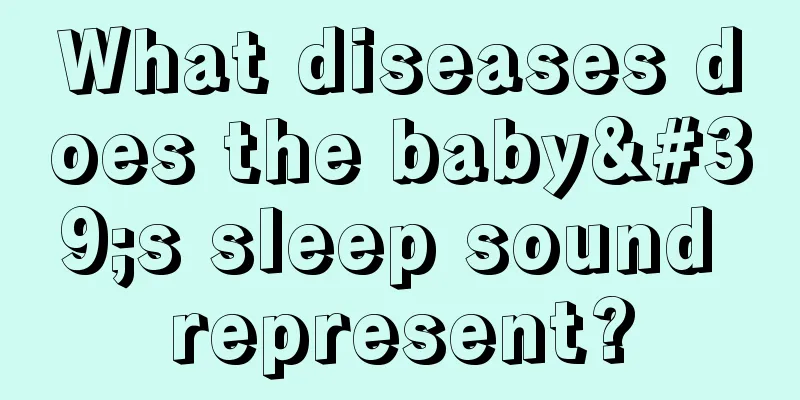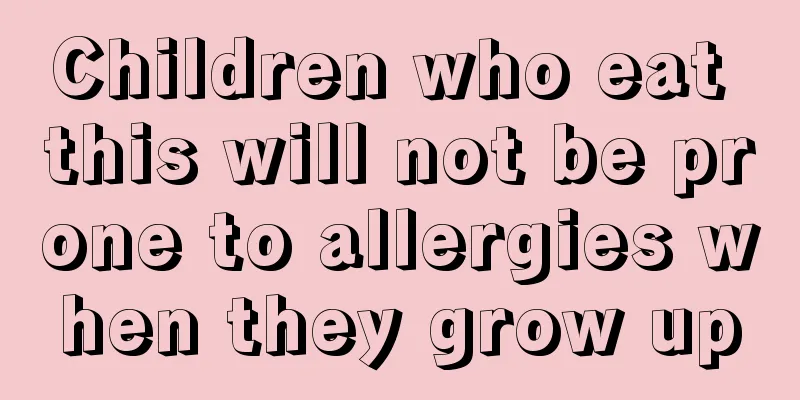What diseases does the baby's sleep sound represent?

|
Many parents who take care of their babies will find that their babies make noises when they sleep, but the symptoms observed during the day are normal and no different from healthy babies. However, when they fall asleep, they make noises, which makes many parents confused. Common noises include throat gurgling when babies inhale when they sleep, teeth grinding when they sleep, etc. In fact, this is a sleep disorder for children, which will affect the normal development of babies. Parents should pay attention to it. So what diseases does the noise of babies making when they sleep represent? Children's sleep disorder is a mental and psychological disorder. It can be caused by functional disorders caused by the interaction between the growth and development of a certain body system and the environment, or by diseases of the respiratory, nervous and other systems. It can directly affect children's sleep structure, sleep quality and degree of recovery after sleep. Its main manifestations are restless sleep; disordered sleep rhythm, such as difficult to control sleep during the day and waking up at night; falling asleep too early, or even falling asleep in the evening; enuresis, teeth grinding, mouth breathing, respiratory apnea, sleep talking, sleepwalking, snoring, laryngeal choking, night terrors (nightmares), convulsions, etc. What diseases does the baby's sleep sound represent? "Laryngitis" during inhalation: severe cases require tracheotomy When babies inhale while sleeping, their throats make sounds, which is mostly congenital. Congenital laryngitis is caused by the weakness and relaxation of the laryngeal tissue in infants and young children, the collapse of the tissue during inhalation, and the shrinkage of the laryngeal cavity, which is also called laryngeal cartilage softening. Babies with congenital laryngeal chorus will make a chick-like sound when they inhale. Babies with mild symptoms will recover on their own when they are two to three years old. Babies with severe laryngeal obstruction will require a tracheotomy. Therefore, parents should pay attention to adjusting the baby's sleeping position. The supine position can alleviate the symptoms. The baby was sleeping soundly but suddenly burst into tears. This may be because the baby's body lacks trace elements, which leads to a decrease in blood calcium and causes excitement of the brain and autonomic nerves, causing the baby to sleep uneasily and cry suddenly. At this time, parents should pay attention to supplementing their baby with calcium and vitamin D. Always "snoring" when sleeping: it may be congenital adenoid hyperplasia If your baby makes a wheezing sound when sleeping, and it is not caused by a cold or nasal congestion, it may be that your baby has congenital adenoid hyperplasia. Babies with congenital adenoid hyperplasia mainly experience symptoms similar to stubborn nasal congestion. They need to be well cared for during their infancy and be careful to prevent colds. The adenoids can be removed when the baby grows up. Grinding teeth while sleeping: Digestive dysfunction There are many reasons why babies grind their teeth while sleeping. It may be that their nerves are too tense before going to bed, causing the part of the brain that manages the chewing muscles to be excited, resulting in continuous chewing movements after falling asleep. It may also be that the baby eats too much food before going to bed, which increases the burden on the stomach and intestines and causes teeth grinding. Babies with unbalanced nutrition and picky eaters may also grind their teeth due to lack of vitamins and trace elements. In addition, poor tooth development and uneven occlusal surfaces when the upper and lower teeth touch is also a major cause of baby teeth grinding. It is not abnormal for babies to make noises while sleeping. The disease can be checked and treated in the early stages to avoid worsening of the condition and endangering the patient's health. Children with poor sleep quality will have slow growth and development, which will cause them to be short in height and have poor academic performance, which will affect their future development and learning. Therefore, parents should observe their children's symptoms in life and take them to the hospital for examination and treatment in time if there are any abnormalities. |
<<: Baby's body temperature range and precautions when measuring body temperature
>>: Nursing methods for 20-day-old baby spitting up milk
Recommend
What to do if the baby always has eye mucus
Therefore, eye mucus is inevitable, as they are n...
Reasons why children sweat coldly when sleeping at night
Many of us parents always have a lot of pressure ...
Why are the newborn's legs shaking?
It is quite common for newborns to have trembling...
Normal values of myocardial enzymes in children
Myocardial enzymes are mainly distributed in the ...
What are the common methods of children's nutrition recipes?
Nowadays, more and more people pay attention to t...
What is the difference between hyperactivity and ADHD?
The child's psychological characteristics are...
What to do if your child has mucus in his nose
The normal functioning of the nasal cavity will s...
First aid for children with a persistent high fever of 40 degrees
If a child's fever reaches 40 degrees, it is ...
What should I do if my baby keeps having diarrhea?
Diarrhea is a common disease in normal times. It ...
What should we pay attention to when children have small intestinal prolapse?
Children always have some problems when they are ...
What to do if your baby loses hair at three months old
Baby's hair loss is a matter that worries par...
At what age is it better to have hernia surgery for children?
Hernia problems in children generally require spe...
At what age is it better for children to sleep in separate beds?
Babies sleep in the same bed with their parents f...
What is the reason why children stutter?
Nowadays, many children often have stuttering pro...
How old is the best age for hernia surgery?
Hernia is a common disease among infants and youn...









